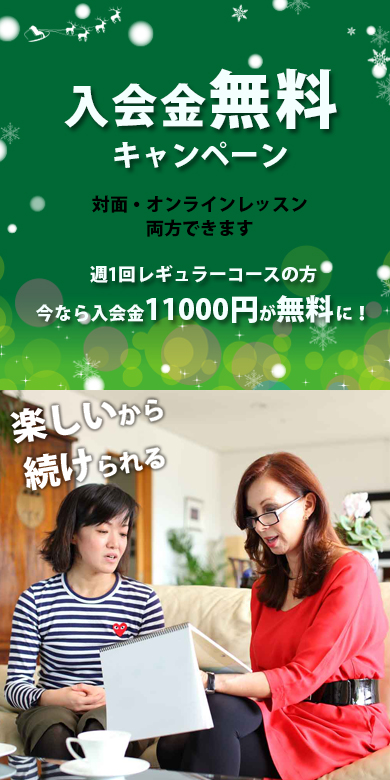「彼は非常に部下に厳しかった」は英語で?
 「英語に訳せそうで訳せない日本語というテーマでETC英会話のナオミ先生(荻窪)のレッスンを受けています。
「英語に訳せそうで訳せない日本語というテーマでETC英会話のナオミ先生(荻窪)のレッスンを受けています。
今日の日本語は
「彼は非常に部下に厳しかった」
これを英訳してみました。ナオミ先生の解説です。
I would use strict if I had a child, and “I am strict to my daughter” or “to my son” or “teacher is strict to her students”.
But 部下 is a very difficult word, right. Yes.
We don’t really have one word that really, really expresses it.
But I thought maybe “personnel” is maybe close to 部下 or just we would say just “workers”.
We really don’t have like “先輩、後輩”.
We have something close to it.
“Oh, He is my 先輩”.
”He is my senior.” No, we don’t say that.
So that’s a little different. The customs is a little different.
Q: You don’t care?
Yeah, we say “he is a 12 grader”, “he is a 11 grader”, like that.
So we really don’t care about those.
We do a little bit, but maybe not as much as てぇJapanese people, right, I guess.
I guess in Japan, I guess, younger people have to be really nice to the older people.
And even the way they talk, they have to talk in a very polite manner.
That is why Japan is like that.
In English, “would you” would be polite, right.
And that’s enough, I think.
So I thought may be “workers”, “personnels” and “staff” is also OK too, I thought.
But “部下”, first I wrote “subordinate”, but I thought maybe this one is a little off too,
not exact is what I thought.
So I thought maybe “personnel” might be better, I thought. Yes, “personnel”.
I thought instead of using “strict”, “strict” is the third one I thought.
I would use maybe “severe”.
In Japanese, you say “シビア”, right, “severe”.
I would say “he was very severe with his staffs” or “with his personnels”, “with his workers”,
And the next one, I was a kind of imagining and I imagined some kind of maybe, maybe a lady, 部長, or something, when I was thinking.
Maybe they can be “harsh”.
Do you know the word “harsh”, being a kind of a strong on these people like not talking so kindly, but maybe shouting at them something harsh kind of feeling. Harsh, harsh, harsh.
“You don’t want to be harsh to people”, “you don’t want people to be harsh to you”, because it’s a kind of strong feeling, right.
And then it’s kind of mean, like 意地悪, like a little mean.
Then I thought “he was very harsh towards his workers”, “harsh towards”, 向かって to his workers was another one that I thought.
And in my third one was maybe “strict”.
So I think it depends on the situation.
But “strict” mainly for students, maybe, and maybe “severe”, “harsh” would be better for like adults at a company and office.
Q: harsh はそういう感情的な、、
Yes, “harsh”.
When you say “harsh”, you would think this person is not a very calm person, maybe alway probably shouting at people, or this is an images, not all the time.
But whatever they do, they are not really calm.
Whatever they do is like “why is it this way?”, “why is that way?”.
They are always harsh, strong on people, or on anything.
This is my image of “harsh”.
Q “severe with”はそんなイメージはあまりないんですね。
Yes, “severe” is the same as Japanese “シビア”, right, so kind of a, it’s very close to “strict”.
“Severe” was another one that I thought.
Q: あまりharshな上司と働きたくないですね
Yes. Of course not.
Q: severeは、、、
“Severe”, maybe, he has a meaning to do that, to make you better or something, to make you in a higher position or something.
But “harsh” is just like one kind of feeling, just strong feeling that is a very negative feeling.
I think so.
It depends on the situation, I think.
severe with 〔…に対して〕厳しくて
harsh towards 〔…に対して〕厳しくて
■出演
■聞き手
・青樹洋文
◆使用楽曲 (BGM)
“Movie Star * (The Making Of X) by Loveshadow
◆ポッドキャストのダウンロードや購読は、iTunes – Podcast – 「RadioETC」からも可能です。


















